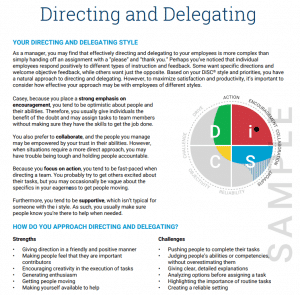Don’t let managers start unprepared
A great employee, a great technical expert, a great accountant, or a great sales associate should make a great manager, right? Maybe not. Management requires a set of skills and tasks that aren’t always easily picked up. Great managers have usually had some training, good feedback, and mentorship. So what can be done to get new managers what they need? How can you help struggling managers? How can you help good managers become great?
How can you help your managers?
When Wiley surveyed over 4,937 working professionals at the end of 2021, respondents were asked to provide one word that describes a good manager. They used words like supportive, leader, trust, and care. When asked to select the top management skills necessary for an effective manager, respondents ranked the more relational aspects of the job highest, with 57% putting communication at the top, followed by developing others (37%) and motivating others (30%).
Like many new managers, I felt under-trained when accepting management responsibilities. I was sent to several classes that covered company HR policies, reviewed the mission statement, went over the company employee evaluation forms, handed me some notes, and referenced the HR website. Most of this information was important, but I didn’t learn how to manage people. What would have helped me?
Develop self-knowledge
Knowing and reflecting on how I managed myself and discovering where I struggled with others would have helped. How do I organize my day? How good of a communicator am I? What motivates me? How comfortable am I in directing someone’s actions? How do I deal with conflict?
Everything DiSC® provides a few tools that can help here. Everything DiSC Workplace is a great introduction to oneself and the ways in which people differ. Everything DiSC Management can help managers build a more accurate concept of themselves as managers by focusing on common management behaviors such as delegating tasks and motivating staff.

Self-knowledge can help a manager work from their strengths, and not just the strengths that made them successful at their job before they became a manager. It can help them understand that others aren’t always motivated by the same things they are. A manager might be creating an environment they like but one that isn’t comfortable for their direct reports.
An assessment can help a manager understand how they can be more flexible in their behaviors—sometimes choosing to act outside their comfort zone. Self-knowledge can also make a manager better at coaching staff and helping them grow in their jobs. In other words, a manager might say, “Now that I understand myself, I can focus on understanding you.”
Communicate purpose and vision
A manager will not be able to make decisions based on the business’s mission or help staff understand their roles if the manager doesn’t fully understand where their unit fits into the organization’s mission. If your leadership hasn’t created or communicated a vision, hasn’t made it clear why the business exists and what it values, then this can be very hard on the manager. (You might want to run your leaders through Everything DiSC Work of Leaders if this is the case.)
The first strategic task for your new or struggling manager will be to create a vision for their unit that’s aligned with the organization’s. The manager’s role in setting and communicating objectives will be much easier if those are aligned with a strong vision. The first communication task will be to convey the value of their team’s tasks. Workers want an understanding of how their contributions tie together with the larger whole.
Improve communication
My husband was telling me about how the army base he’s on offered remedial English to senior officers, expecting a handful to show up for a class or two. Instead, all the classes were immediately filled. Good leaders understand the critical role of clear, concise, and consistent communication.
Executives can make the manager’s job much easier through their own transparent, technology-appropriate, audience-focused communication. Whether it’s giving a word of praise, writing a job description, creating an easy-to-read chart, delivering a presentation, or conducting an effective meeting, communication skills are critical. They need to be taught and practiced.

Communication is also very much about listening. New managers can sometimes hesitate to ask questions. They feel like they should be the ones with the answers. Asking questions and requesting feedback can help establish trusting relationships and can produce insightful answers. Encourage new (and current) managers to ask their staff and others simple questions like these:
- What are three things you’d do if you were put in my role tomorrow?
- What are your biggest barriers to being more successful in your job?
- What can my team do differently to work better with you?
- What do you expect from me as you begin this project?
Building a culture of feedback will make it easier for the manager to provide and receive feedback, even if it feels uncomfortable at first. It will build trust on the team. Encourage new managers to hold one-on-one meetings and commit to their regularity. These will provide opportunities for open and honest communication. Check in on current challenges and ask about recent successes, resource needs, and how the staff and manager together can communicate better or achieve more.
Train and develop employees
Of course, managers need to make sure their direct reports are adequately trained to complete their assigned tasks. But training, evaluation, and development don’t end there.
Managers are usually the person most responsible for an employee’s retention. A manager is responsible for providing resources, additional training, new opportunities, work flexibility, and information about career opportunities in the organization. They are also quick to share evidence of the talents and skills in their teams. The most effective managers often maintain relationships with those who leave their team and take advantage of that network to further the organization’s goals.
Let your new managers know what opportunities are available in your organization. It might be a certification program, an opening on a service committee, or new work-from-home rules. Then let them know that they are responsible for sharing those details. Train them to learn what motivates their staff so they’ll better understand what they need to share and how to share it.
Lead a team
Team success is critical to business success. Managers are responsible for forming and leading teams. Harvard Business School Professor Amy Edmondson has spoken about The End of Teams as We Know It. She states: “We’re going to have to get better at learning how to quickly relate to people we don’t know; learning how to trust them, learning how to share our knowledge, extract their knowledge, synthesize it, even though we come from very different backgrounds, different expertise areas and so forth.” The new manager needs to model effective team behavior.
Act on data
Managers need to know what data is available to them, how to use it, and how to make it meaningful to their staff. They need to know how to get the information they need. Often this means interacting with other departments, creating new assessments, and evaluating what’s been used in the past. Data can be quite industry-specific, and training managers on gathering and interpreting data should also be specific. If your company is a large one, it can be helpful to bring in people from different units for this training as a way of breaking artificial barriers in their work.
Management training mistakes to avoid
Not providing managers to meet across organizational silos
If your organization is already siloed, manager training by department can make it worse. Managers can learn so much from each other, especially when in different departments. HR can facilitate these meetings or they can be informal.
Making it all about risk avoidance
Managers do need to know how to hire, how to enforce policies, and how to meet regulatory requirements. However, the focus should be on developing strong teams, on innovation, on doing work together that they can be proud of.
Assuming that a single round of training is enough
New challenges will present themselves. Even seasoned managers might be struggling now with changes in work-from-home policies. The world changes; the marketplace changes; the generations change. Consider what new or refresher training your current managers would find useful.
Making training an HR-only issue
Managers can benefit from mentoring from those above. Hearing from the C-suite can be informative and inspirational, and add credibility to the training.
Often the HR department doesn’t have the capacity to provide all the training managers need. Don’t hesitate to call in a trained consultant or specialist to supplement your training. This can be especially helpful if you’re trying to train managers at one time in multiple fields like IT, engineering, and sales. They may have similar needs but will benefit from having their learning framed in their own languages. Consultants can also introduce techniques and tools new or unfamiliar to your organization.

